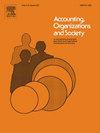The impact of repeated notifications and notification checking mode on investors' reactions to managers’ strategic positive title emphasis
Abstract
We conduct an experiment to examine how repeated earnings notifications and the mode in which investors check notifications affect their reactions to managers' strategic positive emphasis in earnings release titles (i.e., when firm performance is not as positive as the emphasis indicated in the title). We predict and find that a title with (versus without) a strategic positive emphasis can result in both a negative content incongruency effect and a positive title impression effect. Consistent with our expectations, we find that repetition not only dampens the negative content incongruency effect but also amplifies the positive title impression effect. As a result, compared to a title without a strategic positive emphasis, we find that a title with a strategic positive emphasis is more likely to result in a favorable investment judgment when investors receive repeated notifications in a one-by-one mode than when they receive a notification for the first time. These results are consistent with our predictions. We also explore the impact of title emphasis when investors receive repeated notifications in an all-at-once mode. Our results show that a strategic positive title emphasis does not influence investment judgment when investors check repeated notifications all at once, suggesting that a small behavioral change can protect investors from being swayed by managers’ strategic positive title emphasis.

 求助内容:
求助内容: 应助结果提醒方式:
应助结果提醒方式:


